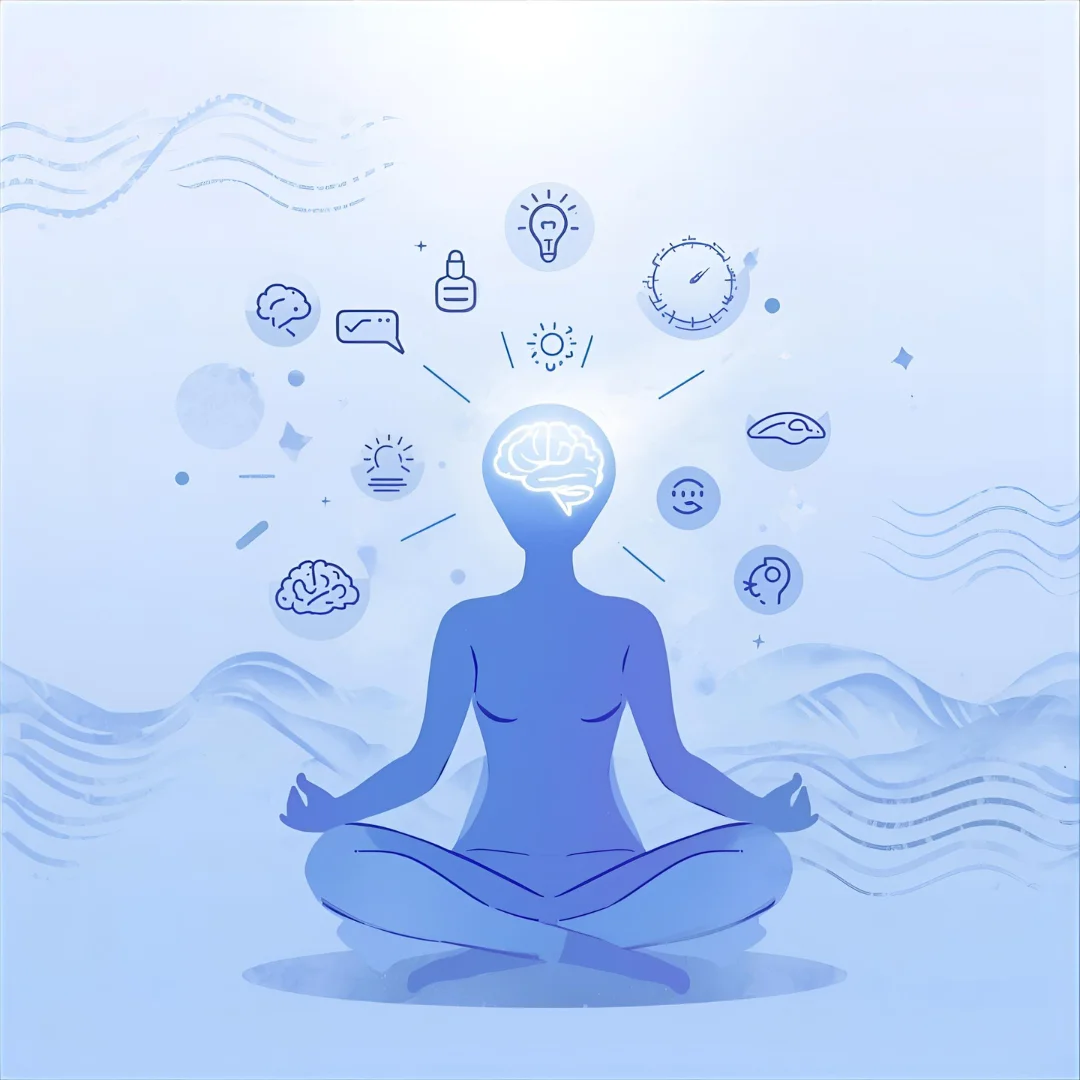Encuentra la Mejor Hora para Dormir y Despertar Renovado
Dormir bien no se trata solo de cuánto duermes, sino de cuándo duermes. La Calculadora de Sueño te ayuda a descubrir la mejor hora para acostarte o despertarte según tus ciclos naturales de sueño. Al alinear tu hora de dormir con el ritmo natural de tu cuerpo, te despertarás con energía, alerta y listo para comenzar el día.

Calculadora de Sueño
Calcula los mejores horarios para despertar o dormir basados en ciclos naturales de sueño
Los ciclos de sueño duran aproximadamente 90 minutos. Despertarse entre ciclos te ayuda a sentirte más descansado. Añadimos 15 minutos para quedarte dormido.
Tus Horarios Recomendados
Basado en ciclos de sueño de 90 minutos
💡 La Ciencia del Sueño
- Un ciclo de sueño completo dura aproximadamente 90 minutos
- Cada ciclo incluye 5 etapas: sueño ligero, sueño profundo y REM
- Despertar al final de un ciclo te hace sentir más descansado que despertar a mitad del ciclo
- Se recomienda dormir de 4 a 6 ciclos completos (6 a 9 horas)
- Añadimos 15 minutos para que te quedes dormido
Temperatura Ideal
Mantén tu habitación entre 15-19°C para un sueño óptimo
Sin Pantallas
Evita dispositivos electrónicos 1 hora antes de dormir
Oscuridad Total
Usa cortinas opacas o un antifaz para bloquear toda la luz
Limita la Cafeína
Evita café y estimulantes al menos 6 horas antes de dormir
¿Qué es una Calculadora de Sueño y Cómo Funciona?
Una calculadora de sueño es una herramienta científica que estima tus horas ideales para dormir y despertar utilizando la regla del ciclo de sueño de 90 minutos.
Cada noche, tu cuerpo pasa por varias etapas de sueño, incluyendo el sueño ligero, el sueño profundo y el sueño REM. Despertarte al final de un ciclo, y no a la mitad, permite que tu cuerpo se sienta naturalmente descansado.
Para usarla, simplemente:
Elige la hora a la que deseas despertarte.
O selecciona la hora a la que planeas acostarte.
La calculadora estimará tus horas óptimas de sueño o de despertar basándose en tus ciclos de sueño.
Este método te ayuda a mejorar la calidad de tu descanso, tu concentración y tu salud en general, simplemente comprendiendo cómo tu cuerpo descansa de forma natural.
¿Qué Son los Ciclos y Etapas del Sueño?
El sueño no es un estado único, sino un ritmo repetitivo compuesto por varios ciclos de sueño de calidad. Cada ciclo dura aproximadamente 90 minutos e incluye cuatro etapas clave que se repiten a lo largo de la noche.
Etapa 1 – Sueño Ligero:
Transición entre la vigilia y el sueño.
Etapa 2 – De Sueño Ligero a Profundo:
La respiración se vuelve más lenta y la temperatura corporal disminuye.
Etapa 3 – Sueño Profundo (NREM):
El cuerpo repara los músculos, fortalece el sistema inmunológico y regenera los tejidos.
Etapa 4 – Sueño REM:
El cerebro se activa, ocurren los sueños y se procesan las emociones y la memoria.
Una noche completa de descanso normalmente incluye de 4 a 6 ciclos de sueño, con una duración total de 6 a 9 horas.
Despertarte al final de un ciclo te ayuda a sentirte más alerta y con energía, mientras que hacerlo a mitad de un ciclo puede dejarte somnoliento o cansado.
¿A Qué Hora Debería Acostarme o Despertarme?
Si a menudo te preguntas “a qué hora debo acostarme”, la respuesta depende de la hora a la que necesites despertarte.
Por ejemplo, si debes levantarte a las 7:00 a. m., las mejores horas para dormir serían aproximadamente a las 9:00 p. m., 10:30 p. m. o 12:00 a. m., lo que te permite completar ciclos de sueño de 90 minutos.
Nuestra calculadora de ciclos de sueño hace estos cálculos automáticamente por ti.
Simplemente ingresa tu hora deseada de despertar y te mostrará las mejores horas para acostarte, asegurando que te levantes descansado y con energía.
También puedes usarla al revés. Si vas a dormir ahora mismo, la calculadora te mostrará las mejores horas para despertarte según el ritmo natural de tu sueño.


¿Por Qué Dormir en Ciclos es Más Importante que Dormir Más Horas?
Dormir ocho horas no siempre significa descansar bien. Lo que realmente importa es completar los ciclos de sueño, no solo la cantidad total de horas dormidas. Interrumpir un ciclo puede hacerte sentir agotado, sin importar cuánto hayas dormido.
Seguir los ciclos de sueño te ayuda a:
Nuestra calculadora de sueño te ayuda a alinear tu hora de dormir con tu ritmo circadiano, el reloj interno natural de tu cuerpo para un sueño constante y de alta calidad.
¿Cuántos Ciclos de Sueño Deberías Completar por Noche?
El número ideal de ciclos de sueño depende de tu edad y estilo de vida. La mayoría de los adultos necesita entre 4 y 6 ciclos completos, lo que equivale aproximadamente a 6 a 9 horas de sueño.
|
Grupo de Edad
|
Duración Recomendada del Sueño
|
Número de Ciclos
|
|---|---|---|
|
Niños |
9–11 horas |
6–7 ciclos |
|
Adolescentes |
8–10 horas |
5–6 ciclos |
|
Adultos |
7–9 horas |
4–6 ciclos |
|
Mayores (65+) |
6–8 horas |
4–5 ciclos |
💡 Consejo: Enfócate en completar los ciclos en lugar de solo contar las horas. Despertarte al final de un ciclo de 90 minutos es el verdadero secreto para sentirte descansado.

Calculadora de Sueño para Trabajadores por Turnos y Horarios Nocturnos
Si trabajas de noche o tienes un horario irregular, nuestra calculadora de sueño para trabajadores por turnos te ayuda a planificar tus horas de descanso según tu jornada laboral. Solo ingresa la hora en la que planeas dormir, incluso si es por la mañana o la tarde, y la calculadora te mostrará los mejores horarios para despertarte evitando la inercia del sueño y la fatiga.
Para mejorar la calidad de tu sueño durante horarios inusuales:
- Usa cortinas opacas para bloquear la luz solar.
- Mantén una rutina de sueño constante, incluso en tus días libres.
- Evita la cafeína y la luz azul antes de dormir.
- Mantén tu habitación fresca y silenciosa.
Incluso los trabajadores nocturnos pueden mantener un ciclo de sueño saludable con una buena planificación y hábitos adecuados.
Beneficios de Dormir Según tus Ciclos Naturales de Sueño
Dormir a la hora adecuada ofrece poderosos beneficios físicos y mentales. Aquí te explicamos por qué completar correctamente tus ciclos de sueño es más importante de lo que crees.

Beneficios Físicos
- Mejora la recuperación muscular y la reparación celular.
- Equilibra las hormonas y el metabolismo.
- Fortalece el sistema inmunológico.
- Reduce el riesgo de enfermedades cardíacas y diabetes.
Beneficios Mentales
- Mejora la memoria, la concentración y la toma de decisiones.
- Disminuye la ansiedad, la depresión y el estrés.
- Potencia la creatividad y el equilibrio emocional.

Con la Calculadora del Sueño, puedes alinear fácilmente tu cuerpo con su ritmo natural de sueño y disfrutar de un descanso más profundo y reparador.
Cómo Usar la Calculadora del Sueño (Guía Paso a Paso)
Usar la Calculadora del Sueño es rápido y sencillo. Solo sigue unos pocos pasos para encontrar tu hora ideal para dormir y despertarte, basándote en los ciclos naturales de sueño de 90 minutos. Te ayudará a dormir mejor y a despertarte renovado cada día.
Selecciona tu hora de despertar deseada.
La calculadora te recomendará las mejores horas para dormir, basándose en ciclos de sueño de 90 minutos.
O ingresa tu hora actual de dormir.
Si te vas a dormir ahora, te mostrará las horas ideales para despertarte sin interrumpir un ciclo.
Apunta a tener de 4 a 6 ciclos por noche.
Cada ciclo dura aproximadamente 90 minutos, así que planifica tu descanso en consecuencia.
Crea el ambiente adecuado para dormir.
Una habitación oscura, silenciosa y fresca favorece un sueño profundo y una mejor recuperación.
Repite cada noche.
Mantener un horario constante ayuda a regular tu ritmo circadiano y mejora tus niveles de energía generales.
Qué es el Sueño REM y por Qué es Importante
La etapa de sueño REM (Movimiento Ocular Rápido) es cuando tu cerebro sueña, consolida recuerdos y restaura el equilibrio emocional. Interrumpir esta fase al despertarte en medio de ella puede hacer que te sientas somnoliento, confundido o emocionalmente agotado.
Nuestra calculadora de ciclos de sueño estima automáticamente tus fases REM y NREM, asegurando que tus horarios de despertar se alineen con el ritmo natural de tu cuerpo. Esto te ayuda a disfrutar de un descanso más profundo y días más productivos.
Preguntas Frecuentes
Get in Touch with the Sleep Calculator Team
Have a question, suggestion, or feedback about our Sleep Cycle Calculator? We’d love to hear from you.
Our team is always ready to help you understand how to make the most of your sleep schedule, bedtime calculations, or general questions about sleep hygiene and sleep cycles.
Whether you’re looking to report an issue, request collaboration, or simply share your experience, please reach out using the form below or via email.
Consejos para Mejorar la Calidad de tu Sueño
Mejorar tu sueño va más allá de los horarios. Combina la calculadora con hábitos diarios saludables para lograr un mejor descanso.
Estos simples cambios pueden mejorar significativamente la calidad de tu sueño, especialmente si los combinas con tu rutina de la Calculadora de Sueño.
Start Your Journey to Better Sleep Today
Try the free Sleep Cycle Calculator now and discover your ideal bedtime or wake-up time. Plan smarter, sleep deeper, wake refreshed — every day.